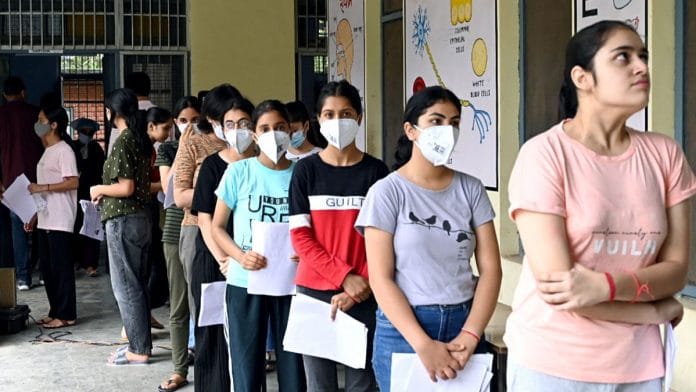A relative recently complained of dizziness for two days. On the third day, I received a call and advised an eye, ear and blood pressure check-up. That same evening, I was told that the relative had developed a slurring of the voice, which I could not notice and asked them to go to a hospital. They went to a private hospital, where the medical officer said that there was nothing to worry about. I got on the call and told her that these are classic signs of a stroke and urged them to do an MRI. Usually, doctors tend to listen to their seniors, and the MRI was done – it revealed a middle cerebral artery stroke.
Basic elementary MBBS training would have enabled a graduate to think of such disorders. But there is a reason why it was missed in this case. Blame the NEET process.
As French writer Jean-Baptiste Alphonse Karr wrote in 1849, “the more things change, the more they stay the same.”
Also read: For Indian students going abroad, only destinations change — and the crisis
NEET coaching centres and answer sheets
While Indian policymakers extoll the virtues of the ‘magical’ WHO ratio between doctors and patients to churn out more medical graduates and the National Medical Commission (NMC) makes an elaborate teaching programme where the students will be compelled to come and see patients, two factors were ignored.
The first, which is known to all, is the fact that the paucity is in the villages where graduates will not be compelled to practice. There is not much paucity in urban areas. The second more ominous fact is that even in the ideal scenario, our graduates do not really bother about the NMC’s elaborate competency training because the ultimate goal is to crack the NEET exam, which is the gateway to post-graduate seats. In our days, we were told to study for five years, work in the wards during out internship, and then prepare for the entrance exam. Then came the coaching institutes, largely started by doctors. Because the exam questions were rudimentary MCQs made by AIIMS for many years, almost all institutes had a “crack” answer guide to them. The recent clinical questions-based NEET exams are also online mode questions, and the coaching institutes have elaborate classes to help MBBS students answer them.
What is worse is that students study notes and online courses of these coaching institutes during their MBBS years, and I have even seen them sitting in the library with tablets running these lectures! Most, if not all, of these ‘star coaching teachers’ probably have one-tenth of the clinical expertise of a government college faculty, but they know what is asked in the NEET exams. The whole training programme on patient-based learning is ignored by MBBS students. So, India is producing graduates who have near zero knowledge of how to treat and deal with actual patients. Ward posting and OPD training involve the art of communication, observing subtle signs, taking the patient into confidence and then using that knowledge appropriately. What we are producing is ‘coached’ students who have no expertise. I shudder to think what they can do in real-life scenarios. In fact, I would never have such doctors treat anyone.
Also read: Indian drawing room talk on ‘merit’ stands demolished by Supreme Court NEET ruling
No knowledge of actual patients
During the recent Foundation Day celebrations of the Ram Manohar Lohia Hospital, the health secretary said that the three qualities that doctors should have are empathy, communication and touch. This is in addition to the knowledge gained during MBBS. Those who claim that online consultation and AI will replace doctors are divorced from reality. I will never accept any advice based on such artificial and algorithmic interfaces. One of the unique qualities of so-called ‘quacks’ or ‘RMP’ is their connect with the patient, which the current generation of students completely misses out on. In a recent article, a doctor who owns a famous coaching institute extolled the virtues of online teaching, making a mockery of the profession and the art that we practice. Sadly, of course, commerce has clouded the basic sense of many such coaching institutions and their owners.
While the NeXT or the National Exit Test promises to change things with exams based on actual patient assessment, we all hope that it succeeds so that it distances students from the pernicious grips of coaching institute training. The current NEET system churns out graduates with zero clinical acumen. People may question the logic of churning our graduates without adequate faculty with ad hoc extension of retirement age, which leads to stagnation of recruitment of faculties and focus on the monetary gain of college managements, but what we miss out on is the enormous gains made by the coaching industry. What we have now are ‘NEET-coached MBBS students’ and not doctors. So, it doesn’t make much difference if the MBBS students are from China or Ukraine or India because ultimately, they see the degree as a stepping stone to the NEET exam for which the elaborate NMC curriculum is reduced to “notes” provided by the “experts” in coaching institutes.
As Bon Jovi sang:
“The new improved tomorrow isn’t what it used to be
Yesterday keeps comin’ ’round, it’s just reality
It’s the same damn song with a different melody.”
The author is a professor of dermatology at RML Hospital, New Delhi. Views are personal.






